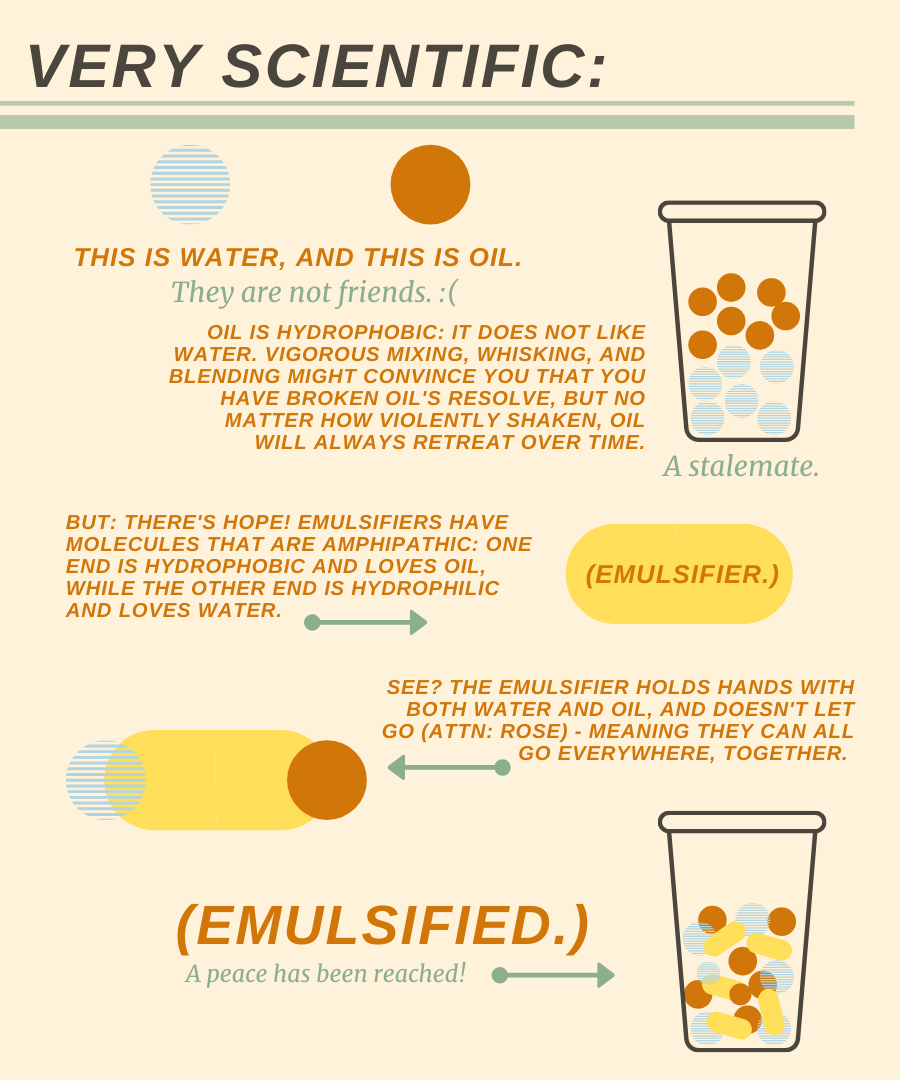All About the Function of an Emulsifier in Food and Its Relevance in Modern Food
Emulsifiers are pivotal in contemporary cuisine, helping with the blend of immiscible liquids like oil and water. Their capacity to support blends improves the texture and taste of various food items. From salad dressings to baked items, emulsifiers play a substantial function in both business and home cooking. Yet, the science behind their function and the future innovations in their usage continue to be much less discovered. Emulsifier In Food. What extra could be discovered concerning these crucial culinary representatives?
Comprehending Emulsification: The Scientific Research Behind the Refine
Emulsification may appear like a simple cooking method, it involves intricate clinical concepts that are crucial for creating steady combinations of immiscible fluids, such as oil and water. At the heart of this process lies the concept of surface tension, which avoids both fluids from mixing naturally. Emulsifiers, compounds that reduce surface stress, play a vital duty in helping with the mix of these fluids. They possess both hydrophilic (water-attracting) and hydrophobic (water-repelling) properties, enabling them to anchor themselves at the user interface in between oil and water.
When an emulsifier is presented and the mixture is perturbed, it forms a safety obstacle around distributed droplets of one fluid within the various other, supporting the blend. This action not only improves texture and mouthfeel in food items yet likewise adds to their visual charm. Emulsifier In Food. Recognizing the science behind emulsification is fundamental in modern food, enabling cooks to produce a range of sauces, dressings, and emulsified meals
Typical Types of Emulsifiers Used in Food
Emulsifiers are essential ingredients in the food sector, playing an essential role in maintaining blends of oil and water. Different sorts of emulsifiers are typically used, each with one-of-a-kind properties matched for various applications. Lecithin, originated from soybeans or egg yolks, is just one of one of the most popular natural emulsifiers, usually discovered in delicious chocolates and dressings. Mono- and diglycerides, which are originated from glycerol and fatty acids, are commonly used in baked products and margarine to enhance structure and expand service life. Another typical emulsifier is polysorbate 80, favored for its capability to improve the uniformity of ice creams and sauces. In addition, xanthan periodontal and guar gum work as thickening agents that additionally add to emulsification in gluten-free items. These emulsifiers are essential to developing a stable, tasty item in contemporary food solutions, making sure a positive sensory experience for consumers.
The Function of Emulsifiers in Different Food Products
A selection of food items count on emulsifiers to accomplish wanted structures and security. These substances assist in the blending of immiscible liquids, such as oil and water, which is necessary in numerous refined foods. For circumstances, in salad dressings, emulsifiers help preserve a constant blend, avoiding splitting up and enhancing life span. In baked products, they add to an uniform crumb structure and wetness retention, enhancing total quality.
Emulsifiers also play a considerable duty in milk products, such as gelato and yogurt, where they support fat beads, making sure a smooth mouthfeel. In addition, in sauces and condiments, they enhance viscosity and enhance spreadability. This functionality is vital in the production of delicious chocolates, margarine, and mayo, where a natural item is necessary. Overall, using emulsifiers in various food products is integral to modern food production, boosting stability and uniformity across a vast array of products.
How Emulsifiers Enhance Structure and Flavor

When included into foodstuff, emulsifiers substantially improve both structure and flavor, developing a more delightful eating experience. These materials help with the i was reading this blending of active ingredients that generally do not blend well, such as oil and water, causing a smoother, creamier uniformity. This not only boosts mouthfeel yet additionally enables tastes to distribute evenly throughout the product, intensifying the general preference.

Emulsifiers in Home Food Preparation: Tips and Techniques
Just how can home chefs properly utilize emulsifiers to improve their meals? Emulsifiers play a crucial duty in achieving preferable structures and tastes in homemade recipes. As an example, making use of egg yolks in mayo or hollandaise sauce permits a secure solution, integrating oil and water properly. Home cooks can likewise explore mustard, which functions as an emulsifier in vinaigrettes, making sure a smooth uniformity.
In cooking, integrating lecithin, discovered in egg yolks or soy, can improve dough stability and moisture retention. In addition, making use of industrial emulsifiers like xanthan periodontal or guar periodontal can assist thicken sauces and dressings while keeping a velvety mouthfeel.
When producing gelato or whipped toppings, emulsifiers can prevent ice crystal development, leading to a smoother structure. By grasping these techniques, home chefs can considerably elevate their culinary creations, giving constant and pleasurable dishes that the original source showcase the power of emulsification.
The Future of Emulsifiers in Culinary Innovation
As the cooking world remains to progress, the function of emulsifiers is poised to end up being increasingly cutting-edge and varied. Breakthroughs in food scientific research are causing the development of brand-new emulsifying agents derived from all-natural resources, which cater to health-conscious consumers and enhance the sensory high qualities of dishes. Advancements such as plant-based emulsifiers are acquiring grip, enabling cooks to create vegan and allergen-free alternatives without jeopardizing appearance or flavor.
Furthermore, the use of emulsifiers in molecular gastronomy is increasing, enabling cooks to experiment with special textures and discussions that astound diners. As sustainability ends up being a priority, the future might see a change towards environment-friendly emulsifiers that reduce environmental effect.
Inevitably, emulsifiers will proceed to play an important duty in culinary technology, connecting the void between tradition and modernity, and enabling cooks to press the borders of creativity in their kitchens.
Often Asked Concerns

Are Emulsifiers Safe for Individuals With Allergies?
Emulsifiers can be risk-free for individuals with allergic reactions, relying on their certain sensitivities. However, certain emulsifiers, originated from allergenic resources like soy or eggs, might trigger responses, requiring careful ingredient examination and assessment with healthcare specialists.
Exactly How Do Emulsifiers Affect Food Life Span?
Emulsifiers improve food rack life by maintaining blends, avoiding splitting up, and decreasing microbial development. This stability aids preserve appearance and flavor with time, enabling items to stay secure and appealing for intake longer than without emulsifiers.
Can Emulsifiers Be Derived From All-natural Sources?
Yes, emulsifiers can be stemmed from natural resources such as plants, eggs, and milk items (Emulsifier In Food). These natural emulsifiers aid maintain mixes, improving structure and consistency in different food applications while being chosen for health-conscious customers
What Are the Environmental Effects of Emulsifier Manufacturing?
The ecological effects of emulsifier manufacturing include resource deficiency, habitat devastation, and contamination from synthetic processes. Natural emulsifier sourcing can alleviate some results, but on the whole, industrial methods still present significant eco-friendly challenges to ecological communities worldwide.

Exist Vegan Emulsifiers Available out there?
Yes, there are a number of vegan emulsifiers offered out there, such as lecithin stemmed from soy or sunflower, guar gum, and xanthan gum. These choices accommodate plant-based diets without compromising emulsifying homes.
Emulsifiers are vital components in the food industry, playing an essential role in stabilizing combinations of oil and water. A range of food products depend on emulsifiers to accomplish desired appearances and security. When incorporated into food items, emulsifiers substantially improve both texture and flavor, creating an even more satisfying eating experience. Additionally, emulsifiers can maintain air pockets in whipped items like creams and mousses, leading to a light and airy appearance. Emulsifiers boost food shelf life by maintaining blends, preventing separation, and lowering microbial growth.